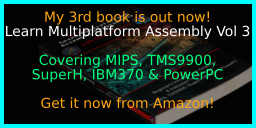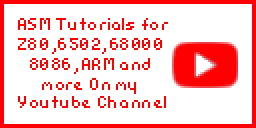

The eZ80 is an enhanced version of the Z80... still technically an 8 bit processor, it has a 24 bit address bus and extends the previously 16 bit registers to 24 bit - this allows addressing up to 16mb memory.
There is a new 'ADL MEMORY mode' which works in full 24 bit addressing.... 'Z80 Memory Mode' emulates a classic Z80.
As the eZ80 is an extension of the Z80, This tutorial assumes you understand the basics of the Z80... if you do not, you need to start here.
 |
If
you
want to learn eZ80 get the Cheatsheet!
it has all the Z80 commands, and new enhanced commands the eZ80
adds to the cpu |
 |
ChibiAkumas eZ80 tutorials
Z80 Hello World Series
| Lesson H1- Hello World on the TI-84 |
Z80 Platform Specific Lessons
| Lesson P1 - Bitmap Hello World and sprite drawing on the Ti-84 in 16bpp [T84] |
| Lesson P2 - Bitmap Hello World and sprite drawing on the Ti-84 in 16 colors (4bpp) [TI8] |
The Z80 is an 8 bit processor, usually around 4 MHz, but 6mhz versions exist.
The MSX Turbo-R R800 is also 100% Z80 compatible, with 4x the effective speed.
Each Register can only store one byte (0-255), but some registers can be used in certain cases together as 16 bit pairs. For example HL together are 16 bits, and can store 0-65535.
Each of the registers has a 'purpose' it is intended for., but you can use any register for anything you want!
The different registers all have 'strengths' because many commands will only work with certain ones, and some commands may be slower or need more code if you use the wrong one.
The Z80�s large number of registers makes z80 programming very different to a system like the 6502.
The Z80 uses a 16 bit address bus. This means it can address $0000-$FFFF (0-65535) giving a total of 64k. Systems like the 128K Amstrad 6128 get around this limitation via bank switching.
In addition to the addressable memory, the Z80 also addresses hardware ports via OUT and IN.
On some systems like the MSX, ports are 8 bit. These use register C as the port number in commands like "OUT (C),A" but on on other systems like the CPC or Spectrum it�s 16 bit, using BC. Annoyingly the command is still the rather misleading "OUT (C),A"!
You may wonder why some use 8 bit ports, and some use 16 bit ones, The difference is not the Z80 itself, but how the Z80 is wired up in the computer.
On the Z80 when commands have two parameters: The parameter on the right is the source, the parameter on the left is the destination.
For example: "ADD HL,DE" will add the source DE to the destination HL.
Finally it should be noted the eZ80 is a more enhanced Z80 with a 24 bit address bus, which is also backwards compatible with the Z80.
The eZ80 registers are an extension of the classic Z80, and it's main registers have been upgraded to 24 bits.
The eZ80 has had all it's registers pairs extended - an 'upper' byte (HLU/BCU/DEU) has been added... this can not be used on it's own - just when HL/BC/DE is loaded in entirety by a command like "LD HL,$123456"
Main
Registers:
|
Flags:
SZ-H-PNC
|
|||||||||||||||||||||||||||||||||||||||||||||||||||||||||||||||||||||||||||||||||||||||||||||||||||||
CPU Modes
| Mode | ADL | MADL | MBASE | MMU |
| Native Z80 | 0 | 0 | 0 | off |
| Virtual Z80 | 0 | 0 | !=0 | off |
| Native Z180 | 0 | 0 | 0 | on |
| Virtual Z180 | 0 | 0 | !=0 | on |
| ADL Mode | 1 | doesn't matter | doesn't matter |
Memory mapped registers
| Address |
Purpose |
Details |
| $000038 | CBR - Common Bank Register | Used by 80180 compatibility mode (Z180) |
| $000039 | BBR - Base Bank Register | Used by 80180 compatibility mode (Z180) |
| $00003A | CBAR - Common Bank Area Register | Used by 80180 compatibility mode (Z180) |
We can do this with suffixes to the command... these contain two parts... the first part is the CPU mode (S or L for Short or Long)... the second part is the Parameter mode (IS or IL for Short or Long)
| CPU Mode |
Parameter Mode |
Command | Result | |
| SIS | Short (Z80) |
Short (16 bit) |
LD.SIS HL,$A2A3 LD.SIS (HL),BC LD.SIS (HL),$B2B3 |
HL = $??A2A3 (U=$00 in ADL mode - Unknown
in z80 mode) $89CDEF = $3456 ($89CDEF) = $B2B3 |
| SIL | Short (Z80) |
Long (24 bit) |
LD.SIL HL,$A1A2A3 LD.SIL (HL),BC LD.SIL (HL),$B1B2B3 |
HL = $??A2A3 (U=$00 in ADL mode - Unknown
in z80 mode) $89CDEF = $3456 ($89CDEF) = $B2B3 |
| LIS | Long (eZ80) |
Short (16 bit) |
LD.LIS HL,$A2A3 LD.LIS (HL),BC LD.LIS (HL),$B2B3 |
HL = $??A2A3 (U=$00 in ADL mode - Unknown
in z80 mode) $ABCDEF = $123456 (S had no effect) ($ABCDEF) = $00B2B3 |
| LIL | Long (eZ80) |
Long (24 bit) |
LD.LIL HL,$A1A2A3 LD.LIL (HL),BC LD.LIL (HL),$B1B2B3 |
HL=$A1A2A3 $ABCDEF = $123456 ($ABCDEF) = $B1B2B3 |
| The
eZ80 has two modes... Classic Z80 mode where ADL=0... in this mode register pairs like HL are 16 bit. eZ80 mode (ADL Mode) is the new mode where ADL=1.. in this mode register triples like HL are 24 bit. |
 |
Loading from, and writing to ram
Loading and Pushing Effective Addresses
Strange new registers!
Switching Between Z80 and eZ80
 |
We're going
to use tons of command extensions to switch between Z80 and eZ80
mode on a per command basis! If you need to see more details... you need to read this section here |
| There are two stacks on the eZ80... the Z80
'Short stack' SPS and the ADL eZ80 'Long stack' SPL When we switch between modes, these may both be used. |
 |
| We can use these
commands irrespective of the starting mode... We can use CALL.IL
from either Z80 or eZ80 mode... the only important thing is that
we use RET.L to return. As RET.L uses the 'Extra' mode byte on the stack, we cannot use it with a regular CALL |
 |
|
Cpu |
Cpu |
Suffix |
SPS (16 bit) |
SPL (24 bit) |
New PC |
|---|---|---|---|---|---|
|
S |
S |
none |
PC.L, PC.H |
|
MBASE, Addr.H, Addr.L |
|
L |
L |
none |
|
PC.L, PC.H, PC.U |
Addr.U, Addr.H, Addr.L |
|
S |
S |
.IS |
PC.L, PC.H |
02h |
MBASE, Addr.H, Addr.L |
|
L |
S |
.IS |
PC.L, PC.H |
03h, PC.U |
MBASE, Addr.H, Addr.L |
|
S |
L |
.IL |
|
02h, PC.L, PC.H |
Addr.U, Addr.H, Addr.L |
|
L |
L |
.IL |
|
03h, PC.L, PC.H, PC.U |
Addr.U, Addr.H, Addr.L |
 |
Rather than
specify the full extension, we can specify half, and the rest
will be 'filled in' based on the current mode. Lets see all the options... |
Switching modes for a single command (.S and .L)
 |
In most cases the suffix
hasn't made a difference between IS and IL suffixes, but it
depends on the MBASE, and the command. To be honest though, it's really best to avoid the issue all together, and avoid using suffixes, and in the rare case you need them specify the full .LIL .SIS etc rather than the partial specification. |
 |
DO NOT RUN THESE ON
REAL HARDWARE! - these examples are intended for emulator use
only! OUTing to your hardware could cause problems, hardware damage, and your screen to explode causing shards of glass to poke out your eyes! Don't say I didn't warn you! |
| The
TI-84 causes a NMI to ROM functions whenever an OUT occurs -
which rather ruins our plans to play with ports! However, there's a work around, we can switch to 8 bit mode and write our own dummy NMI handler to play with ports... lets have a go! |
 |
New Port Commands
| IN |
Out |
Port |
Src/Dest |
Actions After |
Repeat Until |
| IN0 r,# |
OUT0 (#),r |
$00## | r | ||
| IND2 |
OUTD2 |
$BBCC | (HL) | DEC HL, DEC C, DEC B | |
| IND2R |
OTD2R | $DDEE | (HL) | DEC HL, DEC DE, DEC BC | BC=0 |
| INDM |
OTDM |
$00CC | (HL) | DEC HL, DEC C, DEC B | |
| INDMR |
OTDMR | $00CC | (HL) | DEC HL, DEC C, DEC B | B=0 |
| INDRX |
OTDRX |
$DDEE | (HL) | DEC HL, DEC BC | BC=0 |
| INI2 |
OUTI2 | $BBCC | (HL) | INC HL, INC C, DEC B | |
| INI2R | OTI2R |
$DDEE | (HL) | INC HL, INC DE, DEC BC | BC=0 |
| INIM |
OTIM |
$00CC | (HL) | INC HL, INC C, DEC B | |
| INIRX |
OTIRX |
$DDEE | (HL) | INC HL,DEC BC | BC=0 |
| We'll only be trying a few port commands in
this episode, The TI-84 doesn't offer many devices we can
access, and some of these commands do strange things (like
reading from port BC, and DECrementing B and C separately) |
 |
| The TI-84 causes a NMI
interrupt every time we send data to a port, which we can't stop
in eZ80 ADL mode, as we can't change the interrupt handler at
&0066 We can however switch to Short mode, in which all the 64k accessible memory is ram, and write our own dummy interrupt handler (Just a RETI command) Here's a simple test program, which will dim the backlight via port &B024. |
 |
| Our program has made the screen dim, it then returns to the OS, though the screen stays dim! |  |
OUT0 - Writing to port &00xx
| OUT0 is a new command, it
uses 16 bit port &00CC - where CC is the C register. This can be used to access the internal IO of the eZ80. Here we use it to read and change the speed of the CPU |
 |
INI2R and IND2R - for 16 bit ranges
INDRX and INIRX - repeatedly read from one address.
INIMR - Read from consecutive ports in the $00xx range
| View Options |
| Default Dark |
| Simple (Hide this menu) |
| Print Mode (white background) |
| Top Menu |
| ***Main Menu*** |
| Youtube channel |
| Patreon |
| Introduction to Assembly (Basics for absolute beginners) |
| Amazon Affiliate Link |
| AkuSprite Editor |
| ChibiTracker |
| Dec/Bin/Hex/Oct/Ascii Table |
| Alt Tech |
| Archive.org |
| Bitchute |
| Odysee |
| Rumble |
| DailyMotion |
| Please note: I wlll upload more content to these alt platforms based on the views they bring in |
| 68000 Content |
| ***68000 Tutorial List*** |
| Learn 68000 Assembly |
| Hello World Series |
| Platform Specific Series |
| Simple Samples |
| Grime 68000 |
| 68000 Downloads |
| 68000 Cheatsheet |
| Sources.7z |
| DevTools kit |
| 68000 Platforms |
| Amiga 500 |
| Atari ST |
| Neo Geo |
| Sega Genesis / Mega Drive |
| Sinclair QL |
| X68000 (Sharp x68k) |
| 8086 Content |
| Learn 8086 Assembly |
| Platform Specific Series |
| Hello World Series |
| Simple Samples |
| 8086 Downloads |
| 8086 Cheatsheet |
| Sources.7z |
| DevTools kit |
| 8086 Platforms |
| Wonderswan |
| MsDos |
| ARM Content |
| Learn ARM Assembly |
| Learn ARM Thumb Assembly |
| Platform Specific Series |
| Hello World |
| Simple Samples |
| ARM Downloads |
| ARM Cheatsheet |
| Sources.7z |
| DevTools kit |
| ARM Platforms |
| Gameboy Advance |
| Nintendo DS |
| Risc Os |
| Risc-V Content |
| Learn Risc-V Assembly |
| Risc-V Downloads |
| Risc-V Cheatsheet |
| Sources.7z |
| DevTools kit |
| MIPS Content |
| Learn Risc-V Assembly |
| Platform Specific Series |
| Hello World |
| Simple Samples |
| MIPS Downloads |
| MIPS Cheatsheet |
| Sources.7z |
| DevTools kit |
| MIPS Platforms |
| Playstation |
| N64 |
| PDP-11 Content |
| Learn PDP-11 Assembly |
| Platform Specific Series |
| Simple Samples |
| PDP-11 Downloads |
| PDP-11 Cheatsheet |
| Sources.7z |
| DevTools kit |
| PDP-11 Platforms |
| PDP-11 |
| UKNC |
| TMS9900 Content |
| Learn TMS9900 Assembly |
| Platform Specific Series |
| Hello World |
| TMS9900 Downloads |
| TMS9900 Cheatsheet |
| Sources.7z |
| DevTools kit |
| TMS9900 Platforms |
| Ti 99 |
| 6809 Content |
| Learn 6809 Assembly |
| Learn 6309 Assembly |
| Platform Specific Series |
| Hello World Series |
| Simple Samples |
| 6809 Downloads |
| 6809/6309 Cheatsheet |
| Sources.7z |
| DevTools kit |
| 6809 Platforms |
| Dragon 32/Tandy Coco |
| Fujitsu FM7 |
| TRS-80 Coco 3 |
| Vectrex |
| 65816 Content |
| Learn 65816 Assembly |
| Hello World |
| Simple Samples |
| 65816 Downloads |
| 65816 Cheatsheet |
| Sources.7z |
| DevTools kit |
| 65816 Platforms |
| SNES |
| eZ80 Content |
| Learn eZ80 Assembly |
| Platform Specific Series |
| eZ80 Downloads |
| eZ80 Cheatsheet |
| Sources.7z |
| DevTools kit |
| eZ80 Platforms |
| Ti84 PCE |
| IBM370 Content |
| Learn IBM370 Assembly |
| Simple Samples |
| IBM370 Downloads |
| IBM370 Cheatsheet |
| Sources.7z |
| DevTools kit |
| Super-H Content |
| Learn SH2 Assembly |
| Hello World Series |
| Simple Samples |
| SH2 Downloads |
| SH2 Cheatsheet |
| Sources.7z |
| DevTools kit |
| SH2 Platforms |
| 32x |
| Saturn |
| PowerPC Content |
| Learn PowerPC Assembly |
| Hello World Series |
| Simple Samples |
| PowerPC Downloads |
| PowerPC Cheatsheet |
| Sources.7z |
| DevTools kit |
| PowerPC Platforms |
| Gamecube |
| Work in Progress |
| ChibiAndroids |
| Misc bits |
| Ruby programming |
Buy my Assembly programming book
on Amazon in Print or Kindle!



Available worldwide!
Search 'ChibiAkumas' on
your local Amazon website!
Click here for more info!


Buy my Assembly programming book
on Amazon in Print or Kindle!



Available worldwide!
Search 'ChibiAkumas' on
your local Amazon website!
Click here for more info!


Buy my Assembly programming book
on Amazon in Print or Kindle!



Available worldwide!
Search 'ChibiAkumas' on
your local Amazon website!
Click here for more info!


Buy my Assembly programming book
on Amazon in Print or Kindle!



Available worldwide!
Search 'ChibiAkumas' on
your local Amazon website!
Click here for more info!


Buy my Assembly programming book
on Amazon in Print or Kindle!



Available worldwide!
Search 'ChibiAkumas' on
your local Amazon website!
Click here for more info!


Buy my Assembly programming book
on Amazon in Print or Kindle!



Available worldwide!
Search 'ChibiAkumas' on
your local Amazon website!
Click here for more info!


Buy my Assembly programming book
on Amazon in Print or Kindle!



Available worldwide!
Search 'ChibiAkumas' on
your local Amazon website!
Click here for more info!


Buy my Assembly programming book
on Amazon in Print or Kindle!



Available worldwide!
Search 'ChibiAkumas' on
your local Amazon website!
Click here for more info!


Buy my Assembly programming book
on Amazon in Print or Kindle!



Available worldwide!
Search 'ChibiAkumas' on
your local Amazon website!
Click here for more info!


Buy my Assembly programming book
on Amazon in Print or Kindle!



Available worldwide!
Search 'ChibiAkumas' on
your local Amazon website!
Click here for more info!


Buy my Assembly programming book
on Amazon in Print or Kindle!



Available worldwide!
Search 'ChibiAkumas' on
your local Amazon website!
Click here for more info!

























































